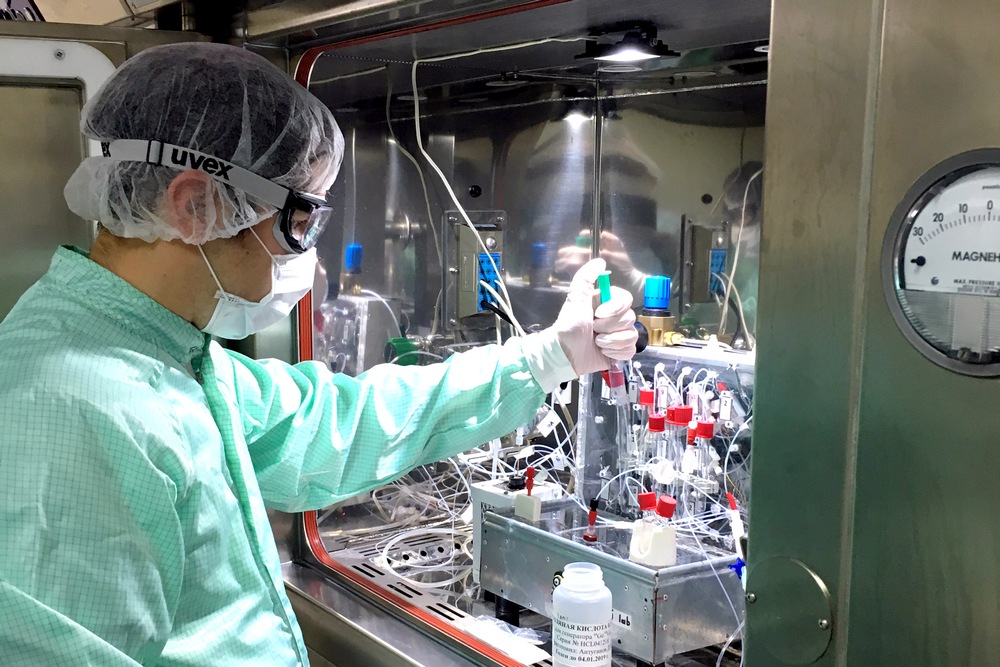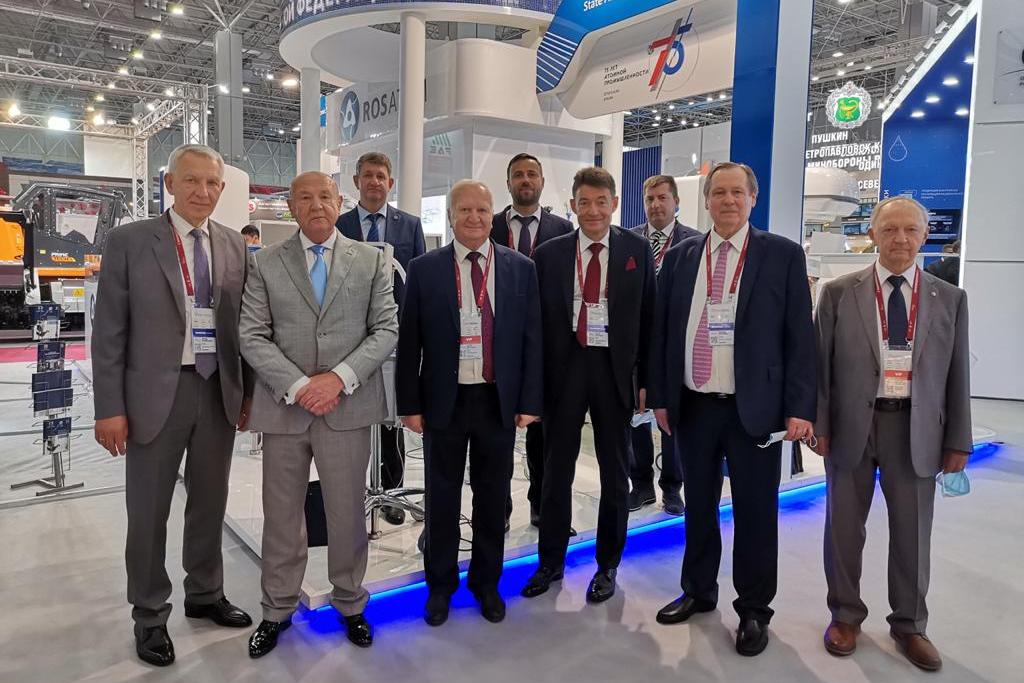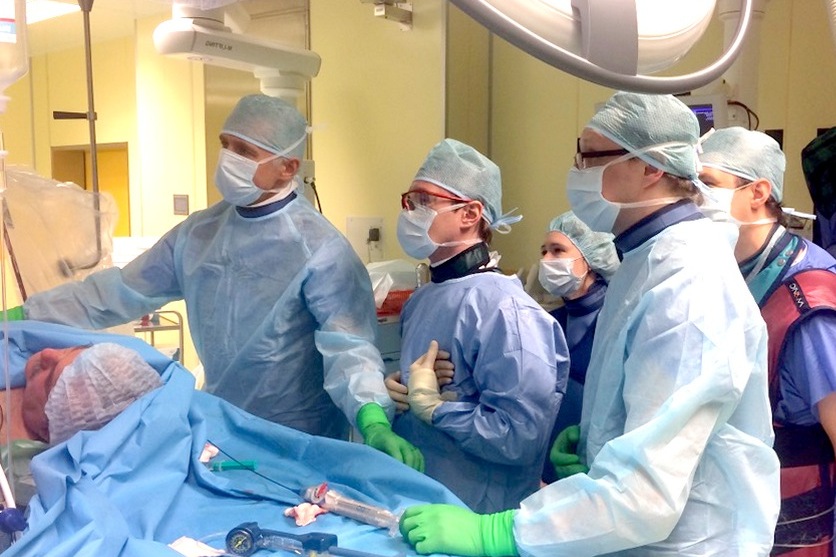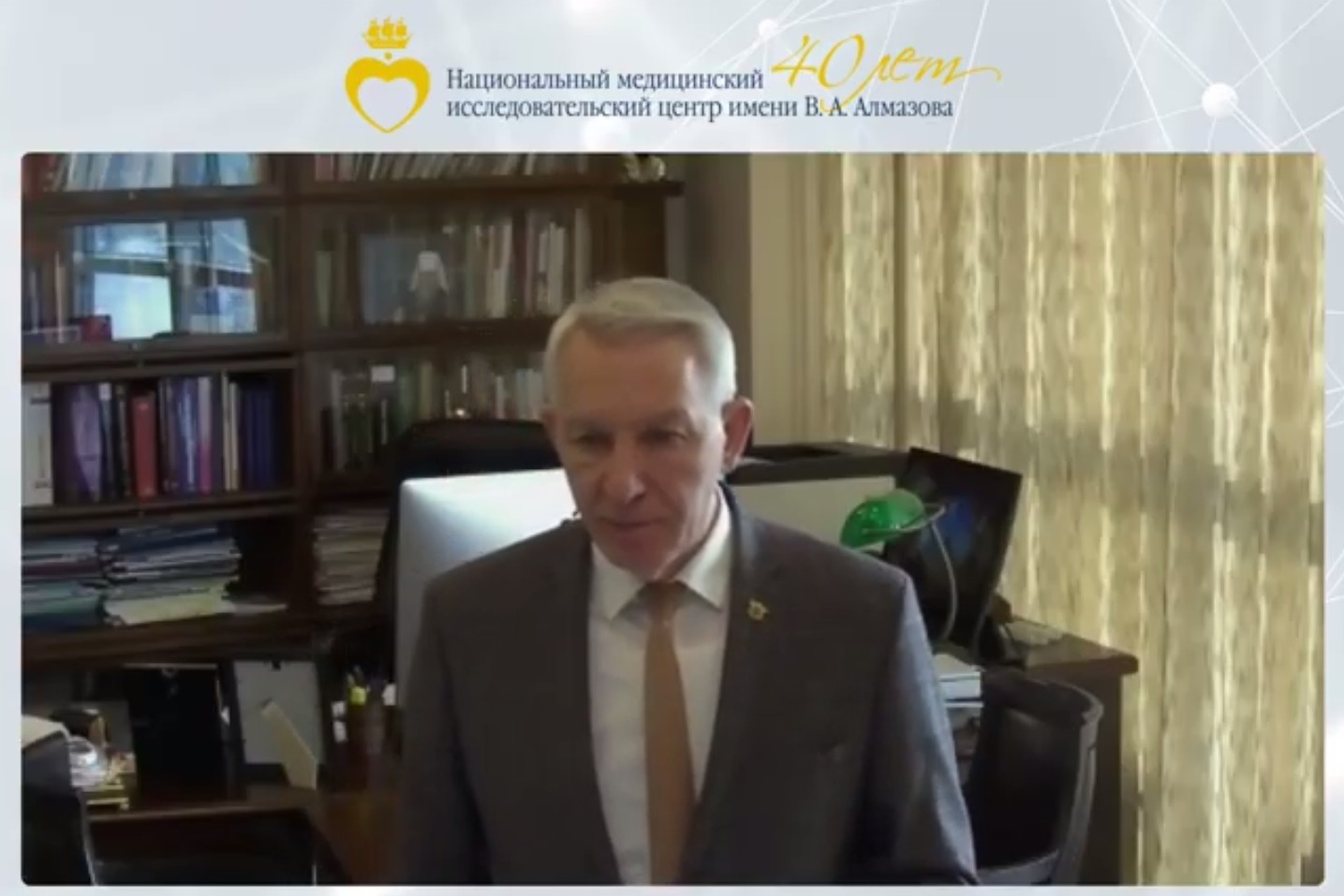Scientific life in 2020




September 29
iCMLf Conversations on COVID-19 and CML
The webinar organized by the International Chronic Myeloid Leukemia Foundation (iCMLf) and dedicated to the problem of treating COVID-19 in patients with CML. The event brought together the specialists of the National Research Centre for Hematology and Almazov National Medical Research Centre.
September 8
Technology of Surfactant-BL inhalation successfully used at Almazov Centre to treat patients with severe COVID-19
In May 2020, Almazov Centre, like most federal medical hospitals, was actively involved in providing care to COVID-19 patients.
Surfactant-BL is an exogenous surfactant, which has been created and approved for medical use in Russia as a preparation being as close as possible in its chemical composition to the natural human surfactant. Almazov Centre has been using Surfactant-BL for ten years for the treatment of respiratory distress syndrome after cardiac surgery and for severe lung injuries of various origins, including pneumonia. Based on that previous experience and the positive results obtained in Russia during the swine flu pandemic, the technology of Surfactant-BL inhalation was used at Almazov Centre to treat 28 patients with severe COVID-19. Sixteen patients in infectious disease wards suffered from lung damage of 75 to 95% and severe gas exchange disorders, requiring transfer to the ICU. Surfactant inhalations resulted in an increase in oxygenation, relieved the shortness of breath and caused subjective improvement in condition.
August 21
Terahertz spectroscopy as a new promising diagnostic method
Specialists of the Endocrinology Institute of Almazov Centre together with colleagues from ITMO University are conducting a study of the optical properties of blood and plasma in the terahertz frequency range.
The study is based on the fact that changes in the chemical composition of blood plasma (for example, with an increased blood glucose levels in diabetes mellitus) induce changes of its optical properties. The technology involves the analysis of not only liquid but also lyophilized (freeze-dried) plasma, which makes it possible to analyze the properties of blood without the influence of water. This ensures the stability of the optical properties of the test sample that can be stored for a long time without freezing.
In the future, the results of the study can be used to develop new methods for assessing various blood parameters using terahertz spectroscopy.
August 19
Vascular Surgery Clinic of Almazov Centre implements the latest technology for fixation of stent grafts for aortic aneurysms
At Almazov Centre, Heli-FX™ system was successfully used in a 69-year-old patient with an abdominal aortic aneurysm diagnosed in 2018, severe comorbidity, an occluded left renal artery, a wrinkled left kidney, and up to 80% narrowing of the lumen in the single right renal artery. The man was admitted to the vascular surgery clinic for health reasons. The case was peculiar due to the large diameter of the aneurysm, the short neck of the aneurysm and renal artery stenosis.
The innovative Heli-FX™ EndoAnchor™ system is intended to provide fixation and sealing between endovascular aortic grafts and the native artery. The Heli-FX™ system is indicated for use in patients whose endovascular grafts have exhibited migration or endoleak, which may cause further growth of the aneurysm sac and its rupture, despite the surgery performed.
July 17
A rare concurrent cardiac surgery performed at Almazov Centre during COVID-19 pandemic
Despite the ongoing pandemic of coronavirus infection, specialists at Almazov Centre continued to provide emergency care to patients with various diseases. A 56-year-old patient from Orenburg underwent a rare concurrent cardiac surgery – simultaneous implantation of an artificial left ventricle of the heart and aortic valve replacement. The procedure was performed by Chief Cardiac Surgeon of Almazov Centre, Honoured Doctor of the Russian Federation, Professor Mikhail Gordeev.
The purpose of the procedure was to gain time while waiting for a donor organ. The titanium pump was implanted to pump blood from the left ventricle of the heart into the aorta. The pump is powered by wearable portable batteries that require periodic charging. The artificial aortic valve prevents blood from flowing back from the aorta to the left ventricle of the heart.
The implanted artificial left ventricle “AVK-N” is a device that has been certified as a bridge to transplantation and not as a replacement therapy for long-term support. Therefore, the heart transplant is supposed to be performed within a year. At the same time, the latest generation of implantable pumps allows testing the functions of heart ventricles for a long time.
July 16
Genetic Engineering and Cell Therapy Laboratory established at Almazov Centre
In July 2020, as part of the state assignment of the Russian Health Ministry “Development of allogeneic tumor-specific T cells with an anti-CD19 chimeric antigen receptor” (supervised by Director of the Institute of Oncology and Hematology Professor Andrey Zaritskey and Head of Department of Fundamental Oncology with Genetic Engineering and Cell Therapy Group Alexei Petukhov) Almazov Centre opened the new laboratory of genetic engineering and cell therapy.
Experimental production and purification of DNA preparations, adeno-associated and lentiviral vectors is currently underway. The laboratory is capable of producing up to 40 liters of culture containing the target product in one cycle.
As part of an experimental research, based on selected candidate vectors, by the end of 2021 it is planned to manufacture batches of an allogeneic CAR-T drug for preclinical trials of therapy for lymphoproliferative diseases.
By the end of this year, the scientists intend to scale up the production of adeno-associated vectors.
July 10
Round-table meeting “Cardiovascular Disease: a New Perspective in a Pandemic”
A live round-table discussion was held – “Cardiovascular Disease: A New Perspective in a Pandemic” – to address the problems of chronic cardiovascular diseases. In his presentation, Director General of Almazov Centre Evgeny Shlyakhto described the situation with cardiology care for patients with cardiovascular diseases and specifically with the chronic course of the disease.
The participants of the online event discussed the existing limitations and opportunities to achieve the goals of the national Healthcare project in the control of cardiovascular disease, state support measures and treatment aspects for such diseases during the exacerbation of the epidemiological situation, and the social significance of the problem.
March 12
The Children's Rehabilitation Clinic of Almazov Centre held a conference High Technologies in Gynecology of Childhood and Early Reproductive Period.
The participants of the event discussed a staged approach to specialized and high-tech care for girls with gynecological diseases, quality evaluation of medical care in obstetrics and gynecology, new preventive areas, and much more. The conference featured an interactive workshop on pediatric gynecology where specialists, together with a psychologist, took part in the “doctor-patient” role-playing game.
Growing interest within the professional community not only emphasizes the high relevance of the issues of pediatric and adolescent gynecology, but also contributes to the coordinated work of doctors and the development of scientific and clinical potential.
February 27-29
Almazov Centre hosted the first PhD course with international participation, Concept of Leadership in Healthcare.
The event brought together young doctors from the regions of Russia and the CIS countries, as well as leading specialists of Almazov Centre. Master classes organized as part of the course were devoted to the development of leadership and management skills.
For three days, participants discussed innovations in the field of cardiology, the basics of evidence-based medicine, the future of healthcare, presented their own research and proposed new projects that could improve the quality of medical care.
February 4-6
In the framework of the Memorandum of Understanding between Almazov Centre and the University of Milan, Prof. Alberico L. Catapano paid a visit to the Centre as a Visiting Professor.
Alberico Catapano is a Professor of Pharmacology at the University of Milan, Past President of the European Atherosclerosis Society (EAS), Director of the Laboratory of Lipoproteins, Immunity and Atherosclerosis and of the Centre for the Study of Atherosclerosis at the Bassini Hospital, Chairman of the EAS/European Society of Cardiology (ESC) guidelines for the treatment of dyslipoproteinaemias and Director of the Italian Society for the Study of Atherosclerosis.
On February 4, Professor Catapano gave a plenary lecture “PCSK9: LDL Lowering and Beyond” at the Research Council meeting. The lecture was devoted to the latest possibilities and prospects of lipid-lowering therapy of the near future.
On February 5, Alberico Catapano took part in the teleconference. It was the first teleconference with the participation of an international expert to develop a management strategy for patients with extremely severe and rare forms of atherosclerosis observed in 40 regions of the Northwestern, North Caucasian, Southern and Volga federal districts supervised by Almazov Centre as a National Medical Research Centre.
February 5
Coordinating Council of the Scientific and Educational Medical Cluster “Translational Medicine” held a meeting.
The decision of the meeting was to supplement the work programme for 2020 and instruct the management company to pursue the project for creating an inter-university student scientific society, and recommend Cluster members to take part in the creation of smart clinic technological concepts.
February 2-4
The 11th Annual Conference, Hybrid Technologies in the Treatment of Cardiovascular Diseases was held in Moscow at the National Medical Research Centre of Cardiology and chaired by Professor Renat Akchurin, President of the Russian Society of Angiologists and Vascular Surgeons.
The conference focused on the main areas in the development of minimally invasive cardiovascular surgery. The conference featured presentations on such relevant topics as hybrid technologies in the treatment of multilevel arterial lesions of the lower extremities, minimally invasive treatment of aortic valve disease and aortic arch diseases.
The participants discussed the issue of creating a unified registry of patients with aortic diseases involving three largest medical centres in Russia: National Medical Research Centre of Cardiology (Moscow), Meshalkin National Medical Research Centre (Novosibirsk), Almazov National Medical Research Centre (St. Petersburg).
January 28-31
The Leipzig Interventional Course (LINC) 2020 annual congress was held in Leipzig, Germany. The congress was organized by the German Society of Interventional Surgery.
The specialists of Almazov Centre gained a unique experience in the treatment of patients with complex aortic and peripheral lesions. These cases are of great interest to foreign colleagues. According to the results of poster sessions in the Challenging Cases nomination, the best poster at LINC 2020 was the one from the Department for Vascular and Interventional Surgery of Almazov Centre – a clinical case of successful treatment of a patient with DeBakey type III aortic dissection complicated by ruptured aneurysm and haemothorax.
January 24
On January 24, Saint Petersburg hosted a seminar “Single-photon emission computed tomography combined with x-ray computed tomography (SPECT/CT) in modern clinical nuclear medicine”. The organizers were the St. Petersburg Radiological Society and the Nuclear Medicine Society.
The leading experts in scintigraphy and SPECT/CT attended the seminar: Konstantin Zaplatnikov (Nuclear Medicine Clinic, Nuremberg, Germany); Professor of the RAS Daria Ryzhkova (Almazov Centre); Vyacheslav Sukhov (Nikiforov Russian Centre of Emergency and Radiation Medicine); Sergey Novikov and Pavel Krzhivitsky (Petrov National Medical Research Centre of Oncology).
The seminar focused on the relevant information on new SPECT/CT systems, technical support for SPECT/CT, organization of nuclear medicine departments.
